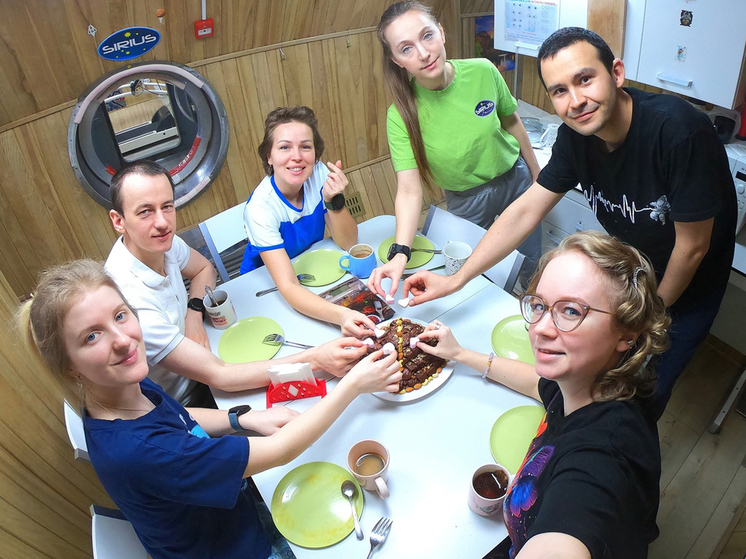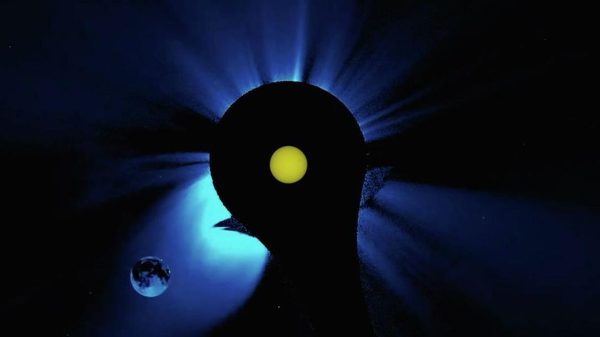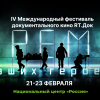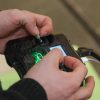The work of nutritionists in a project on long-term isolation
They bake bread, indulge in chocolate, then report for each calorie… Head of the Laboratory of Extreme Nutrition and Food Biotechnology at the Institute of Biomedical Problems of the Russian Academy of Sciences, Candidate of Medical Sciences, general practitioner, nutritionist Ekaterina Burlyaeva spoke about the food preferences of six participants in the SIRIUS-2023 experiment on long-term isolation and the work of nutritionists with them.
 The SIRIUS-2023 crew is in full force. Tasting a new dessert. Photos courtesy of the Institute of Biomedical Problems RAS
The SIRIUS-2023 crew is in full force. Tasting a new dessert. Photos courtesy of the Institute of Biomedical Problems RAS
Let us recall that the experiment simulates human space flight into deep space, but on Earth, in the scientific and experimental complex of the Institute of Biomedical Problems of the Russian Academy of Sciences. The current stage is the fourth in this series, which began in 2017. If the previous ones lasted 17 days, 4 months, 8 months, then this one, which started on November 14 last year, will last for a whole year. On the day of writing this note, the guys were already on their 204th day of “flight”.
The SIRIUS 2023 experiment involves six people. Five of them are Russians — employees of the Cosmonaut Training Center named after. Yu.A. Gagarin Yuri Chebotarev, Khabarovsk Airlines pilot Anzhelika Parfenova, allergist Ksenia Orlova, flight attendant, psychologist, journalist, junior researcher at IBMP Ksenia Shishenina, doctor from IBMP Rustam Zaripov. The sixth participant in the experiment is Olga Mastitskaya, junior researcher at the Institute of Physical-Organic Chemistry of the National Academy of Sciences of Belarus.
Experts tried to bring the experimental conditions as close as possible to space conditions, however, without weightlessness and the corresponding overloads. The task of the testers is to conduct medical, physiological, psychological, and technical experiments. One of the main ones is the study of the peculiarities of the diet of “cosmonauts” flying, according to legend, to distant cosmic worlds. It is important for nutritional scientists to understand for the future what the energy value of travelers’ diets should be, and how many calories they will need on actual flights to the Moon or Mars.
“The 14-day menu for the experiment participants meets the requirements of a real space flight,” says Ekaterina. – The difference is a strict accounting of everything eaten in terms of fats, proteins, carbohydrates and calories. We have not treated this so scrupulously in any other ground-based experiment.
– Our crew is on a permanent basis, filling out “food diaries” every day. This happens during every meal: they record what they ate and how much. Especially for these purposes, together with the Federal Research Center for Nutrition and Biotechnology, a computer program for assessing actual nutrition was finalized. Based on the results of completed food diaries, we can study how the taste preferences of crew members will change, how much the diet provides the daily need for energy and nutrients.
– Despite the fact that individual norms, we have derived the average daily calorie content — 2800 kcal.
– Usually they eat less than the specified figure, therefore, most often they have the opportunity to vary within a certain corridor. We also ask the children to evaluate what they ate: did they like it, didn’t they like it, what exactly did they not like, did they eat everything or leave something?
– It turned out that they are also changing. When it all just started, their diet was closer to the optimal ratio of proteins, fats, and carbohydrates. Over time, we see a certain preponderance towards proteins and fats.
“In each similar experiment, we are interested in the period of so-called acute adaptation of people who find themselves in a confined space,” says Burlyaeva. – In such conditions, people actively exchange microflora: bacteria living on the skin, mucous membranes, and in the intestines. And this does not always bring positive results. Even if some bacteria do not bother one person, it is not a fact that they will not cause discomfort to a neighbor. We have always seen this: both in previous experiments of the SIRIUS program and in Mars-500.
 From left to right: Rustam Zaripov, Angelika Parfenova, Yuri Chebotarev and Ksenia Orlova. Photos courtesy of the Institute of Biomedical Problems RAS
From left to right: Rustam Zaripov, Angelika Parfenova, Yuri Chebotarev and Ksenia Orlova. Photos courtesy of the Institute of Biomedical Problems RAS
This time we decided to “close” this period of acute adaptation with a bioactive supplement containing dietary fiber. It gave rise to not only good microflora, but also a diversity of microorganisms. Thus, we got good results: perhaps for the first time, there were no complaints from the crew members from the gastrointestinal tract during the acute period.
— In parallel with the study of dietary features, we are conducting research testers' body fat and muscle mass. Of course, a decrease in physical activity is noted despite all cycles of the training process. But our diet is balanced so as to avoid serious changes.
– First, I’ll tell you about the basic diet. Most of it consists of freeze-dried products. These are highly crushed, powdered mashed potatoes, meat, buckwheat porridge with chicken. Soups look the same before diluting with hot water: borscht, cabbage soup, pea soup. Let me remind you that they are freeze-dried to reduce weight and save space in the spacecraft. Canned food also differs among astronauts. All of them are specially prepared to have a viscous consistency — it is impossible for pieces to fall out and fall into the surrounding space.
– Yes. Several times a year, a “docking with a cargo ship” is carried out, and the crew, along with other necessary cargo sent to them, receives so-called bonus products from relatives based on requests sent to them in advance. Most often, the current crew asks for dried fruits, for example, dried mango. They also ask for sausages or dried meat, and a lot of chocolate, in the form of candies or bars. Once they asked for sweet carbonated drinks… And if we allowed everything before, we had to deny them the delivery of a carbonated drink “to the moon”. After all, in space this is prohibited — due to the fact that gases behave very poorly in zero gravity, they are difficult to swallow, they get into the respiratory tract.
— Yes, periodically the crew bakes regular bread, sweet confectionery with nuts, chocolate chips. They decorate the table with them on holidays. But a new experiment with a bread machine is also planned: in the fall, the children will have to bake not just simple bread in it, but functional bread, with a special composition.





















































Свежие комментарии